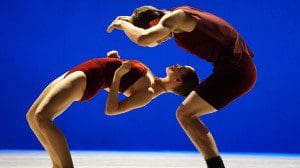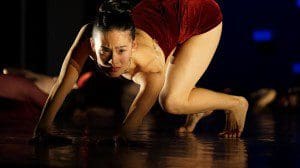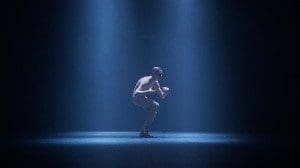Batsheva Ensemble (premiers), Suzanne Dellal, December 17, 2015.* 
*originally published by Jerusalem Post, 22/12/15
photos by Gadi Dagon
Batsheva Ensemble, the younger company, got her day on stage, with two new creations. One of them is a tighter and shorter rendition of Bill, Sharon Eyal's full evening work, originally composed five years ago. The other work And Still by Daniel Agami , which opened the double bill, was tailored for the ensemble. Both Eyal and Agami are former Batsheva dancers and within its frame, had danced together, and absorbed Naharin's Gaga discipline, and now peruse an independent career. 
The revised Bill, , maintained most of the original's artistic building blocks, yet the impression is more somber, restrained, with more introspective approach, which rely more on the intense dancing and well managed balance of large formations. The nude color outfits, silver jelled hair and specific detached perception of the body's limbs, gave the group an alien, cloned look, yet Eyal had mellowed the impression with more opportunities for dancers to do solo roles or gain individual exposure.
There is a great impact of the soundtrack, carefully tailored by collaboration of sound artist Ori Lichtik, Sharon Eyal and Gai Behar. By designing the space through light, Avi Bueno was most instrumental in building layers of shaded ambiance. 
As in all her creations, Eyal dance is greatly physical, passionate, sometimes wildly so with trust out, undulating pelvises and deep plies. There is all of that in Bill, yet Eyal kept the richly textured movement and toned down some throbbing unisons, in favor of more complex compositions.
Daniel Agami was invited to create for the ensemble and the opened the evening with And Still, a dance with strong sense of visual esthetics, evident on opening scene with all its details; original attitude towards space and visual sensitivities or the first duet, with unusual play or curved lines and many more moments. The company was dressed in burgundy velvet outfits designed by Ari Nakamura, and Avi Bueno washed the stage and dancers in quick changes of flashy colored lights, which were hardly justified by the dance itself. At that point, the work seemed to lose its momentum as well. 
The Ensemble has some fine, promising dancers, but in past seasons it presented brighter, tighter cadre, which gave a good hard fight for Batsheva, the mother company itself. I missed that.